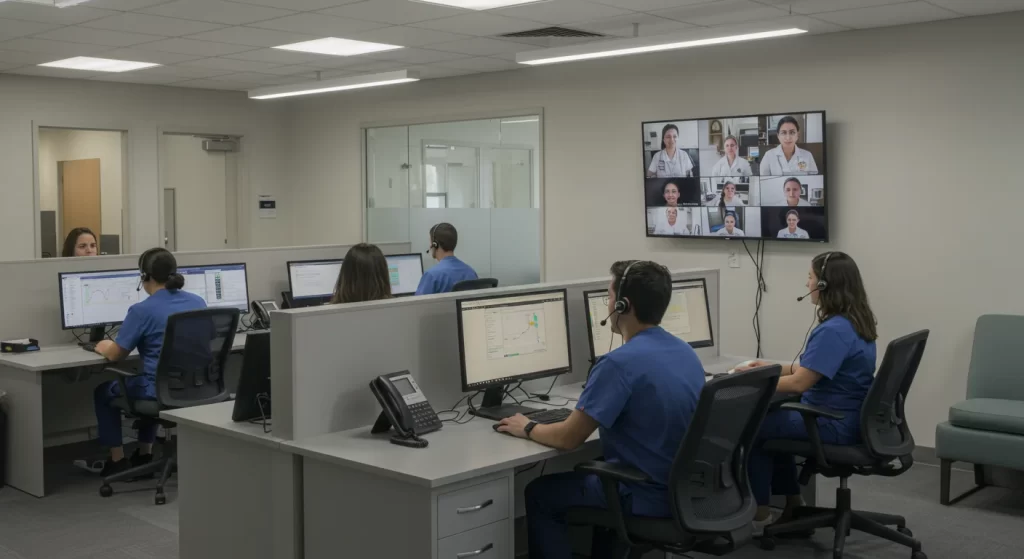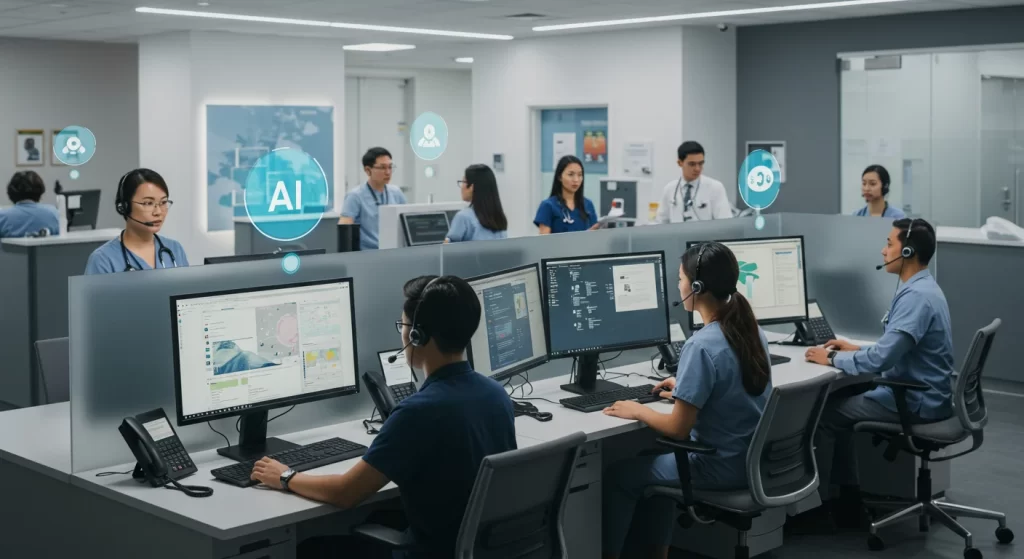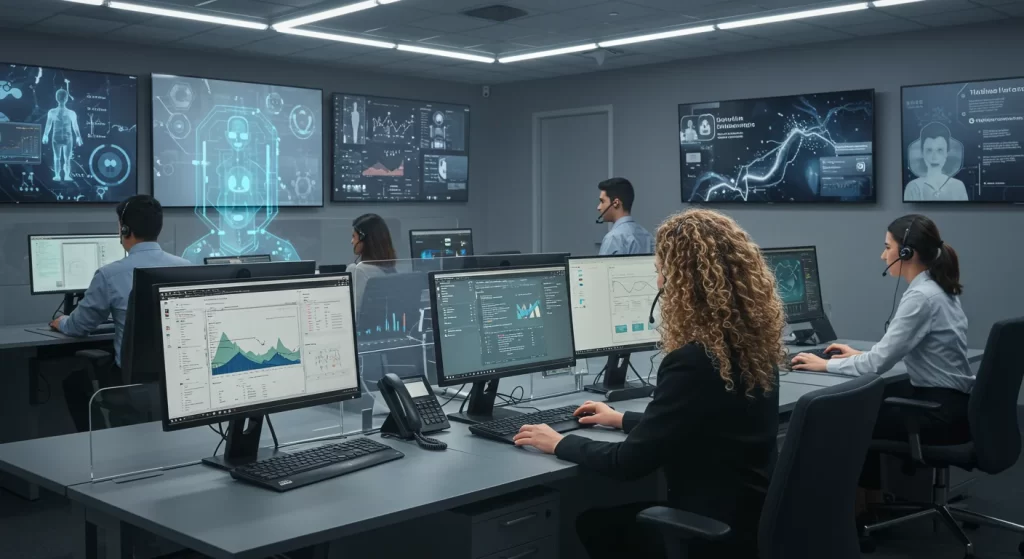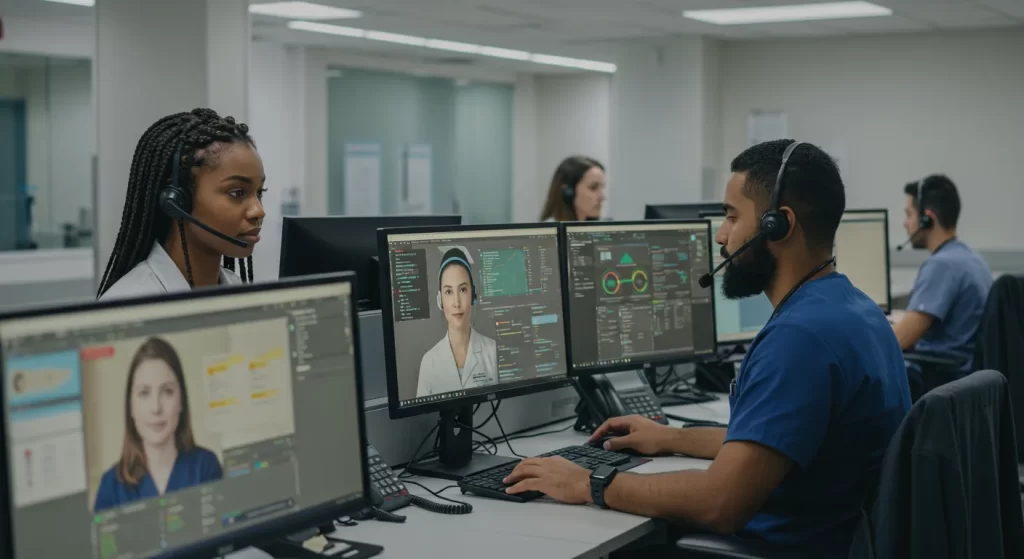The healthcare call center is often the first point of contact for patients, significantly shaping their perception of the care provider. However, traditional call centers face immense pressures. Staff burnout is high due to shrinking workforces and rising patient demands. Patients often experience long wait times, leading to frustration, while operational costs continue to climb.
In this challenging environment, healthcare call center AI emerges as a transformative solution. The strain on existing systems is severe, with overwhelmed agents and persistent hold times indicating a system struggling to cope. Statistics show significant staffing shortfalls, excessively long hold times, and low First Call Resolution (FCR) rates in traditional centers. This suggests that healthcare call center AI is rapidly becoming a necessity.

The introduction of healthcare call center AI also signals a shift from reactive problem-solving to proactive patient engagement. AI enables capabilities like predictive analytics for no-shows or proactive outreach for follow-ups. This allows healthcare organizations to anticipate patient needs, transforming patient interaction into a more continuous, supportive relationship. This article will explore AI healthcare call center solutions, covering definitions, benefits, applications, challenges, and the future of this technology.
SPsoft has vast expertise in developing and integrating healthcare AI agents. Contact us to learn how our robust AI tools can transform your healthcare call center!
Defining Healthcare Call Center AI: Beyond Basic Automation
Understanding healthcare call center AI means looking beyond simple automation. It’s a sophisticated application of technology designed to fundamentally enhance how healthcare organizations communicate with patients.
What is Healthcare Call Center AI?
Healthcare call center AI applies advanced artificial intelligence technologies, including machine learning (ML), natural language processing (NLP), and voice recognition, to automate and enhance healthcare call center operations. The main goals are to improve patient interactions, boost operational efficiency, and support better decision-making. This tech is more than basic chatbots; it involves data analysis, learning from interactions, and providing intelligent support.
Key Differentiators from Traditional Healthcare Call Center Operations
Traditional healthcare call center operations rely heavily on human agents, leading to service inconsistencies, response delays, and limited availability. In contrast, an AI healthcare call center offers distinct advantages:
- 24/7 Availability. AI agents provide assistance around the clock.
- Faster Responses. Automation and intelligent routing reduce wait times.
- Personalized Interactions. AI can use patient data securely to tailor conversations.
- Efficient Handling of High Volumes. AI systems manage many inquiries simultaneously.
The Engine Room: Core Components of an AI Healthcare Call Center
Several key technologies power a modern AI call center healthcare solution:
- Natural Language Processing (NLP). Enables AI to understand, interpret, and generate human language, crucial for effective chatbots and voice assistants.
- Machine Learning (ML). Allows AI systems to learn from data and improve performance, powering predictive analytics and personalizing interactions.
- Voice Recognition & Speech Analytics. Converts spoken language to data and analyzes vocal characteristics like tone and sentiment for insights into patient emotion and urgency. Some systems use voice biometrics for secure identification.
- Conversational AI (Chatbots and Voice Assistants). These interfaces handle tasks from answering FAQs to complex processes like appointment scheduling and triaging patient needs.
The evolution from rule-based systems to NLP/ML-driven healthcare call center AI signifies a leap towards more genuine comprehension. NLP allows AI to interpret intent and context, while ML enables systems to learn and adapt, which is vital for complex and varied inquiries. The integration of these components creates a robust AI call center healthcare solution.
Under the Hood: NLP vs. Rule-Based Logic in Call Center AI Healthcare
Early automated systems used rule-based logic, following predefined scripts. These systems lack flexibility. Modern healthcare call center AI solutions increasingly use NLP, often augmented by ML. NLP-driven systems understand intent and context, allowing for more natural and effective conversations.
Table 1. AI Technologies in Healthcare Call Centers and Their Functions
| AI Technology | Core Function | Example Application in Healthcare Call Center AI |
|---|---|---|
| Natural Language Processing (NLP) | Enables AI to understand, interpret, and generate human language (text and speech). | Powering chatbots to understand patient queries, interpreting free-text patient feedback, enabling voice assistants to comprehend spoken requests. |
| Machine Learning (ML) | Allows systems to learn from data, identify patterns, and make decisions with minimal human intervention. | Predicting patient no-shows, personalizing communication, improving AI response accuracy over time, identifying trends in patient inquiries. |
| Voice Recognition (Speech-to-Text) | Converts spoken audio into machine-readable text. | Enabling voice-controlled IVR systems, transcribing patient calls for record-keeping or analysis, allowing patients to interact with AI using voice commands. |
| Speech/Sentiment Analysis | Analyzes vocal characteristics (tone, pitch, pace) and language to detect emotion, stress, or dissatisfaction. | Gauging patient sentiment during calls to alert human agents to potential issues, identifying urgent calls based on tone, providing feedback on agent empathy. |
| Conversational AI (Chatbots/Voice Assistants) | Facilitates automated, human-like interactions through text or voice interfaces. | Answering FAQs, scheduling appointments, providing medication reminders, guiding patients through simple processes, triaging symptoms. |
The Multifaceted Benefits of AI in Healthcare Call Centers
Adopting healthcare call center AI brings benefits impacting patients, healthcare professionals, and operational efficiency.

Elevating the Patient Journey with AI Call Center Healthcare
For patients, AI in call centers means a more accessible, responsive, and personalized experience. AI agents offer 24/7 assistance, drastically cutting hold times. AI systems can access patient history to tailor conversations and provide relevant support. Predictive analytics enable proactive outreach, like appointment reminders. NLP enhances understanding of patient queries, and AI can support multilingual communication. These improvements lead to higher patient satisfaction and loyalty. Patients experience instant responses, consistent information, convenient self-service, and feel understood through intelligent AI interactions.
Empowering Healthcare Professionals
AI in the healthcare call center empowers human staff. AI automates routine tasks like FAQs and appointment scheduling, freeing agents from mundane work and reducing burnout. Human agents can then focus on complex, empathetic, and critical patient interactions. AI can also act as a “copilot,” providing real-time information and suggestions to agents during live calls. This leads to higher job satisfaction and lower turnover among staff.
Driving Operational Excellence for Healthcare Organizations
Implementing AI call center healthcare solutions offers substantial operational advantages. Automation reduces labor costs and operational overhead. AI minimizes errors, and some solutions have shown significant cost reductions per call. The ROI extends to improved patient safety and treatment adherence, which can prevent costly complications. AI systems handle fluctuating call volumes efficiently and provide data insights for optimizing staffing and resource deployment. AI systems also analyze call data to identify trends and areas for improvement, allowing organizations to optimize service delivery systematically.
Key operational advantages of AI in healthcare call centers:
- Increased First Call Resolution (FCR) rates.
- Reduced Average Handle Time (AHT) for interactions.
- Lower call abandonment rates.
- Enhanced compliance monitoring through automated checks.
Healthcare Call Center AI in Action: Critical Use Cases
The applications of healthcare call center AI are diverse, shifting from isolated solutions to integrated platforms.

Streamlining Appointment Management
AI excels in appointment management by:
- Scheduling. Allowing patients to book appointments via voice or chat.
- Confirmations. Automatically sending confirmations.
- Rescheduling/Cancellations. Enabling easy modifications by patients.
- Reminders. Sending automated reminders, reducing no-shows. AI can even predict no-shows and trigger interventions.
Intelligent Triage
AI triage enhances patient safety and resource optimization. Systems can analyze symptoms, stratify risk based on protocols or ML models, and route urgent cases to nurses or advise emergency care. Non-urgent queries are handled through automation or scheduled follow-ups.
Efficient Handling of Inbound and Outbound Communications
Healthcare call center AI manages communications effectively:
- Inbound. Answering FAQs, providing health information, and intelligently routing calls.
- Outbound. Automating appointment reminders, post-discharge follow-ups, medication adherence checks, and proactive health screening reminders.
Simplifying Billing, Insurance, and Payment Inquiries
Many billing calls are routine queries. AI call center healthcare solutions can explain statements, answer insurance questions, and facilitate payments.
Supporting Medication Management and Adherence
AI can send medication reminders, answer basic dosage questions, and assist with refill requests.
Omnichannel Patient Support
Healthcare call center AI provides consistent support across voice calls, web chat, SMS, patient portals, and mobile apps.
Common tasks automated by healthcare call center AI:
- Appointment scheduling, confirmation, rescheduling, and reminders
- Answering frequently asked questions (e.g., office hours, directions)
- Basic symptom checking and triage guidance
- Processing prescription refill requests
- Resolving common billing and insurance queries
- Sending medication reminders
- Conducting post-discharge follow-ups
- Collecting patient data (intake) prior to appointments
Challenges and Best Practices for Healthcare Call Center AI
Successful healthcare call center AI implementation requires careful planning.
Addressing Initial Investment and Demonstrating Value
Implementing AI involves upfront costs. Healthcare organizations need a clear ROI, demonstrated by efficiency gains like reduced labor costs, lower AHT, increased FCR, and savings from fewer errors or no-shows.
The Criticality of Data Privacy and HIPAA Compliance
Healthcare call centers handle sensitive PHI. AI solutions must comply with HIPAA and GDPR. This includes robust patient identity verification (like voice biometrics or MFA) and secure management of call recordings and transcriptions (encryption, secure storage, access controls, audit logs, patient consent, and data retention policies). The use of non-compliant AI tools by staff is a risk that organizations must manage by providing secure, authorized solutions.
Seamless Integration with EHR and CRM Systems
Effective AI healthcare call center solutions must integrate with EHRs (like Epic, Cerner) and CRMs. This allows AI to access patient history, update records, and trigger workflows. Challenges include data interoperability, lack of standardization, legacy systems, and integration costs. Standards like FHIR APIs are helping.
Ensuring AI Accuracy and Effective Escalation Pathways
No AI is perfect. Robust escalation pathways to human agents are crucial when AI misunderstands or encounters complex situations. AI accuracy must be continuously monitored.
Managing Change and Fostering Adoption
Staff and patients may resist change. Overcoming this requires clear communication of benefits, comprehensive training, and involving stakeholders in the design and implementation.
The Imperative of Maintaining Empathy and the Human Touch
AI lacks human empathy. Over-reliance on AI for sensitive conversations can damage trust. AI should augment, not replace, human empathy. Use AI for routine tasks and train human agents in empathetic communication for complex cases. AI tools like sentiment analysis can support human agents.
Proactively Mitigating Algorithmic Bias
AI models can perpetuate biases present in training data, leading to health inequities. Strategies to mitigate bias include:
- Using diverse and representative training datasets.
- Regularly auditing algorithms and testing for fairness.
- Incorporating fairness-aware design into model development.
- Ensuring transparency and explainability (Explainable AI – XAI).
- Continuously monitoring AI performance in real-world deployment.
Traditional call centers are typically limited by business hours and staff schedules, often resulting in long wait times and variable service quality. In contrast, an AI healthcare call center offers 24/7 availability for many tasks, significantly reduced wait times, and higher potential for personalized interactions. AI handles routine tasks, allowing human agents to focus on complex issues, leading to cost efficiencies and better data utilization for proactive engagement.
Monitoring, Maintaining, and Optimizing Your AI Healthcare Call Center
Deploying AI healthcare call center solutions is an ongoing commitment. Medical knowledge, patient needs, and data patterns change, potentially causing AI model performance to drift. Continuous oversight and agile methodologies are vital.

Key Performance Indicators (KPIs) for Measuring Success
Tracking KPIs is crucial. Key operational efficiency metrics include First Contact Resolution (FCR), Average Handle Time (AHT), Call Abandonment Rate, and Cost Per Interaction. Patient experience is measured by Patient Satisfaction Scores (PSAT/CSAT) and Net Promoter Score (NPS). AI performance metrics include AI Accuracy/Intent Recognition Rate, AI Self-Service Completion Rate, and Escalation Rate. Clinical impact can be seen in No-Show Rate Reduction, Patient Adherence Improvement, and Patient Safety Metrics (e.g., reduced diagnostic or medication errors). EHR/CRM integration efficiency is also important.
Continuous AI Model Monitoring, Updates, and Drift Management
Administrators continuously track AI performance against KPIs, identify and address performance drift, and oversee AI model updates and retraining with fresh, high-quality data. They ensure compliance with new medical guidelines and regulatory requirements. Human oversight of AI decisions remains crucial for patient safety.
Best Practices for AI System Maintenance and Evolution
Adopt Agile and DevOps methodologies for continuous integration, deployment, and optimization. Establish robust data governance for data quality. Implement MLOps for managing the machine learning model lifecycle. Use AI logging for traceability and accountability. Create continuous learning and feedback loops from patients and staff.
The Evolving Role of Human Agents in an AI-Augmented Environment
AI transforms the role of human agents. They will focus on complex and empathetic interactions, develop new skills in emotional intelligence and critical thinking, and act as AI overseers. Agent productivity will shift from quantitative measures to qualitative ones, like the complexity of issues resolved and the quality of empathetic interaction.
The Emerging Trends in Healthcare Call Center AI
Healthcare call center AI is dynamic, with advancements promising more sophisticated solutions:
- The Rise of Emotion AI and Advanced Sentiment Analysis. Future Emotion AI will detect subtle emotional cues in voice and text with greater accuracy. This will enable more empathetic AI responses and provide real-time guidance for human agents to adjust their communication style.
- Hyper-Personalization through Predictive Analytics. Future systems will leverage larger datasets (EHR data, social determinants, wearable data) for hyper-personalized interactions. Predictive analytics will anticipate patient needs, offer customized health guidance, and proactively suggest relevant services.
- Agentic AI for Autonomous Healthcare Call Center Operations. Agentic AI involves advanced AI agents capable of autonomous reasoning, multi-step problem-solving, and proactive issue resolution with less human oversight. Gartner predicts agentic AI will autonomously resolve 80% of common customer service issues by 2029. In healthcare, agentic AI could manage complex patient journeys and proactively identify health issues.
Insights from Industry Reports
Analysts like Gartner note a strong push towards Generative AI (GenAI), with many service leaders planning to pilot customer-facing GenAI solutions. Voice-based service remains important, and the human agent’s role will be redefined, requiring emotional intelligence and technical proficiency. Ethical considerations around transparency and accountability will become even more critical with agentic AI.
The market for AI in healthcare communication is growing robustly. The global healthcare chatbot market is projected to expand significantly. Healthcare is already a major adopter of chatbot technology.
Future AI capabilities to watch in healthcare call centers:
- Proactive health monitoring and intervention suggestions.
- Seamless and intelligent omnichannel orchestration.
- AI-driven generation of personalized patient education materials.
- More sophisticated Natural Language Understanding (NLU) and Generation (NLG), though current models still struggle with the nuances of real medical conversations.
Conclusion
Integrating healthcare call center AI is a pivotal transformation. This technology enhances operational efficiency, elevates patient experience, and supports healthcare professionals. Applications range from automating routine tasks to intelligent triage and personalized outreach.
The journey requires balancing AI’s power with human-centric care. AI should augment human capabilities, freeing staff for complex, empathetic interactions. It’s not a replacement for the human touch. Success involves ongoing learning, adaptation, and refinement, with a commitment to data privacy, security, and mitigating bias.
The success of healthcare call center AI will be measured by its contribution to a more equitable, accessible, and compassionate healthcare system. By leveraging AI, providers can make interactions more efficient and intelligent, freeing human resources to deliver more personalized, empathetic care.
Ready to revolutionize your patient interactions with a state-of-the-art AI call center? SPsoft has the required experience in creating tailored healthcare AI agents!
FAQ
How is an AI call center different from traditional call center software?
An AI healthcare call center uses technologies like NLP and ML to automate tasks, offering 24/7 support, intelligent routing, and personalized interactions. Traditional software relies on manual processes and human agents, often leading to longer waits and limited hours.
Can AI handle both inbound and outbound calls in a medical setting?
Yes, healthcare call center AI manages both. Inbound, it handles inquiries, scheduling, and triage. Outbound, it automates reminders, follow-ups, and proactive health outreach.
Is it a chatbot or a voice assistant — or both?
It can be chatbots (text-based), voice assistants (speech-based), or a combination, often called conversational AI agents. These are generally more sophisticated than simple chatbots.
What kinds of tasks can AI handle in a healthcare call center?
AI handles appointment management, answering FAQs, billing/insurance queries, medication reminders, initial symptom checking, patient data collection, and post-discharge follow-ups.
Is the system capable of prioritizing urgent vs. non-urgent patient inquiries?
Yes, advanced healthcare call center AI uses intelligent triage. It analyzes symptoms and compares them against protocols or learned patterns to identify urgent cases for immediate escalation or guidance.
How does AI improve patient experience in call handling?
AI reduces wait times with 24/7 availability, provides faster resolutions, personalizes interactions using patient data, ensures consistent information, and offers convenient self-service options.
How is patient identity verified during a call?
Secure verification is vital. Methods include voice biometrics (analyzing unique voice characteristics), knowledge-based authentication (less secure), and multi-factor authentication (MFA) for stronger security.
Are voice calls recorded or transcribed, and how is that data managed?
Many AI call center healthcare solutions record and transcribe calls for quality assurance and record-keeping. This PHI must be managed per HIPAA: patient consent, encryption, secure storage, access controls, audit logs, and clear data retention/deletion policies.
Can the AI integrate with EHR systems like Epic or Cerner?
Yes, seamless integration with EHRs (like Epic, Cerner) and CRMs is critical. This allows AI to access patient data for personalization and update records. APIs, especially FHIR, facilitate this.
What happens when the AI doesn’t understand a patient’s question?
The AI should have a clear escalation pathway. It may try to clarify first. If unsuccessful or the query is too complex, it seamlessly transfers the interaction (with context) to a human agent.



